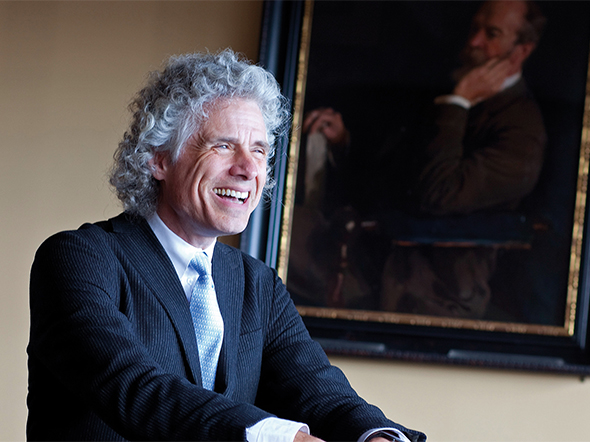FEATURE14 January 2016
Steven Pinker in seven
x Sponsored content on Research Live and in Impact magazine is editorially independent.
Find out more about advertising and sponsorship.
FEATURE14 January 2016
x Sponsored content on Research Live and in Impact magazine is editorially independent.
Find out more about advertising and sponsorship.
Steven Pinker, a professor at Harvard University, is a renowned experimental psychologist and writer on language, the mind and human nature. His most recent book is The Sense of Style: The Thinking Person’s Guide to Writing in the 21st Century

1. You have written about a diverse range of subjects – how do you decide what to turn your attention to, and what do you want to cover next?
Steven Pinker: I like to say that, after writing a book about genocide, mass murder, world war, rape and torture (The Better Angels of Our Nature: Why Violence Has Declined), I decided it was time to write a book on topics that really get people emotionally engaged – namely dangling participles, split infinitives and beginning a sentence with ‘because’. Seriously, there is a common denominator beneath all the subjects I write on: human nature. I have alternated between books that focus on language – such as The Stuff of Thought and The Language Instinct – and books on the rest of human nature, such as How the Mind Works and The Blank Slate.
2. Do you think the way language is evolving, and how we use it, has changed more in the past 20 years – with the advent of digital/social media – than in any similar-length period previously, or is change steady?
SP: I don’t think we know the answer to that. Certainly English went through greater changes in the 12th century, when Old English became Middle English and absorbed thousands of French words and constructions. And again during the 15th century, when Middle English morphed into Modern English, and our ancestors scrambled the vowels (making English spelling so illogical), lost the case system, stopped pronouncing ‘silent’ vowels, and other mutilations.
3. Which audience do you find it easier to write for – a general or an academic one, and why?
SP: An academic audience, by far. With an academic audience, you don’t have to worry about clear and stylish writing, which takes a lot of work.
4. It has been harder to gain mass appeal for science subjects than for the arts because of the difficulty in explaining complex ideas to non-experts – but science appears to be becoming more popular. Do you think that’s because scientists are explaining themselves better, or because the population now has a better level of science understanding?
SP: Both of those are true but, in addition, writing in the arts and humanities has become more obscure, and their underlying ideas more hostile to common sense.
5. In terms of your work on the reduction of violence, how much do you think social media – and the immediate dissemination of information – make us think that dramatic or violent occurrences are on the increase?
SP: In the past, many acts of violence were trees falling in the forest with no-one to hear them. Today, the world contains more than two billion on-the-scene reporters: people with smartphones who can upload footage to the web from almost anywhere. This is bound to give us the impression that violence has increased.
6. Have you ever returned to an area of your research, or carried it on further, and changed your thinking profoundly, or found you had reached the wrong conclusion previously?
SP: Not one, single, dramatic recantation, but certainly many smaller ones.
7. You have talked about the pleasure that comes from insight – how do you feel when you hit on an insight or new concept? How do you celebrate?
SP: I start to write it up, to make sure it doesn’t fall apart as soon as I make it precise. The celebration comes once the book or paper has been written, and I’m satisfied I’ve told a coherent story.
0 Comments